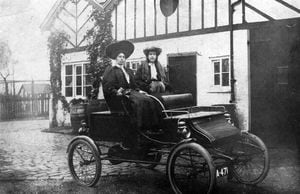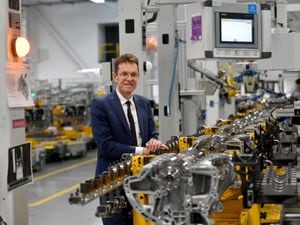Steaming into an eco-friendly future?
Steam cars and airships.

There, climate change sorted. Thanks dad.
You see, I was brought up with them, after a fashion, because my dad was brought up with them during his childhood and was a lifelong advocate of the merits of both.
And I speak as one whose family was a pioneer of eco-driving. In an old photo album is a picture of my gran, in her teens, as a passenger on an early horseless carriage, with her aunt (I think) at the steering wheel, or rather the tiller, as that's how it was steered.
It caused me some headscratching as I couldn't see any engine, but it turned out to be an early electric car. And as my gran was born in 1890, we're talking around 1905.
Electric cars date back to the dawn of motoring, and steam cars had a minor heyday before dying out just as, my dad would say, they developed flash boilers which would have solved one of their problems which caused them to die out.
You couldn't just get in a steam car and drive away. You had to wait for it to generate steam, a bit like waiting for a kettle to boil.
This wasn't such an issue in the days when starting any car was a palaver with hand-cranking and so on, but when electric ignition came in the steam cars – the Dobles and the Stanleys my dad used to talk about so fondly – were consigned to history.
Abner Doble, as it happened, worked for a time at the Sentinel Works in Shrewsbury. There was also a locally-made steam car in the form of the Turner-Miesse, made in Wolverhampton.
While I'm not too well versed in the save-the-planet benefits of steam cars, there was a particular reason my dad had a lifelong love of airships, having been born and brought up at Bedford, close to the massive airship hangars at Cardington which still stand.
One of his childhood memories was of standing at his house with his dad watching R101 circle the town while flashing a Morse message before leaving on its fatal last flight.
"It's saying 'All's Well,'" his dad told him, although he always wondered if his dad had made that up.
What killed off the airships, which unlike aircraft don't have to expend lots of fuel just keeping deadweight aloft, was that the Americans wouldn't let anybody else have helium, so they had to use hydrogen instead, my dad said.
Anyone who has seen the footage of the fiery last moments of the Hindenburg does know the disadvantage of hydrogen. My dad was even positive about that. His argument was along the lines that in airship disasters there were generally survivors, whereas in many aircraft crashes there are none at all.
While those explosive images are difficult to put out of your mind, a major problem with airships is that they are so vulnerable to the weather. America had huge airships filled with non-flammable helium, and they weren't much safer, as they crashed too with loss of life.
And another thing. In the 1930s there were plenty of spare military bods they could rely on to grab on to ropes as the airships came in to dock. Today you would have to pay them all, making handling costs huge and uneconomical.
Nevertheless, my dad thought that when people saw sense both airships and steam cars would make a comeback one day, improved and refined by modern technology and development, and he followed with interest the emergence of some small airships, including the one which was based for a time at Halfpenny Green.
They would naturally make for much slower travel than modern airliners. But then if this really is a climate emergency so bad that Green MP Caroline Lucas wants everybody to be restricted to just one flight every five years, the question boils down to whether we are prepared to give up what we are used to.
During the war petrol was rationed, so everybody on non-military business had to get public transport.
In the oil crisis of the 1970s, petrol rationing coupons were produced, but never used.
And as the most fuel-efficient speed for most cars is between 45mph and 55mph, and the maximum speed limit is 70mph, why do they make cars capable of a gas-guzzling and illegal 100mph?
If Britain is truly serious about tackling climate change, then maybe the past points the way to the future.
Fuel rationing. Airships. Walking, cycling... What's the big hurry anyhow?
You have to make sacrifices. And when I say you, I do mean we, as if everybody else does, I'm happy to go along with it.
I will, though, find it irritating having the Americans and Chinese global polluters sniggering at what they will see as backward Britain.
.................
Just as some people have never seen Star Wars, I had never seen 2001: A Space Odyssey until it was on the telly on Saturday night, so I made a special point of watching what was billed as a classic movie acclaimed as a masterpiece.
I missed the first few minutes, which is unfortunate as I think those must have been the "masterpiece" bits.
The film I saw was like a particularly slow episode of Star Trek followed by a sequence which was rather like watching a lava lamp with a short circuit, but less interesting.
Then there was a baby.
If you haven't seen it, sorry if I've given it away.
.....................
This Cabileaks business has seen secret information released from the highest echelons of Government.
The confidential contents of Cabinet meetings and even the National Security Council are being released to the media quicker than the civil servants can type up the minutes. In fact, they're being leaked to the media even before they get to Any Other Business.
It is a state of affairs which is causing great consternation. The person presiding over this Cabileaks scandal needs to be held to account.
The trouble is that she has been holed up at an address in central London for nearly three years and nobody can get her out.





